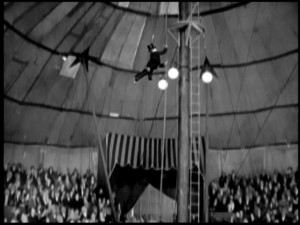Charlie Chaplin’s The Circus
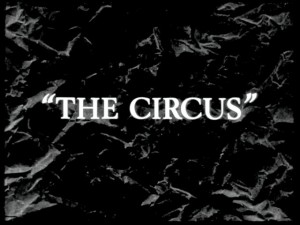 Here’s the idea behind “A Canadian, an American, a Lawyer, and an Elitist”: Rhett’s favorite movie is Meatballs 4, Shawn has an unhealthy fixation on Resident Evil, Richard scoffs at anything that isn’t pretentious and hoity toity, and Adam is a prick who hates everything. We all watch far too many movies, and spend our time analyzing them. So we each watch the same movie, write our analysis of them, and then go to a chat room to discuss it, unaware of what the others have written. A warning: if you haven’t seen the film we are discussing, it may not be best to read this article, because it is spoiler heavy.
Here’s the idea behind “A Canadian, an American, a Lawyer, and an Elitist”: Rhett’s favorite movie is Meatballs 4, Shawn has an unhealthy fixation on Resident Evil, Richard scoffs at anything that isn’t pretentious and hoity toity, and Adam is a prick who hates everything. We all watch far too many movies, and spend our time analyzing them. So we each watch the same movie, write our analysis of them, and then go to a chat room to discuss it, unaware of what the others have written. A warning: if you haven’t seen the film we are discussing, it may not be best to read this article, because it is spoiler heavy.
As is the case with most of the Elitist articles, this was written in 2005, so please keep that in mind when reading it. Also, the chat portion opens with many references to Au Hasard Balthazar, which was a movie we discussed before, and referenced in a number of other chats. For those who prefer not to do their own research, Balthazar is a donkey who is a Christ figure in the movie, and at one point, has his tail lit on fire.
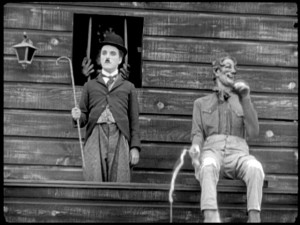 Analysis by a Canadian: Rhett Miller
Analysis by a Canadian: Rhett Miller
Alongside Mary Pickford and Florence Lawrence, Charlie Chaplin became the world’s first ever movie star. Although celebrity seems like nothing these days, what with reality TV and Andy Warhol’s 15 minutes mantra, imagine its impact in the early 1900’s. Before film, actors would have to tour around in shows or play in consignment to theater venues. The potential audience was limited, and actors were never usually the main draw. So imagine the culture shock Chaplin must have experienced in the early days of cinema, where suddenly people from all over the world were lining up to see films based on nothing but his star power. The relationship between the spectator and the performer takes on a weighted importance when featured on such a scale. Celebrity was a term as new to Chaplin as it was to the world. After dealing with his status as a movie star for so long throughout the 10’s and 20’s, Chaplin finally sought to address the nature of his business and his celebrity with his revelatory 1928 film, The Circus.
On the surface, The Circus is as brisk and enjoyable as Chaplin’s other most famous silent comedies. It’s filled with sight gags, grounded in a romance, and complete with grandiose stunts. It’s your typical ode to the little guy on the street corner. Yet, at the center of the film is something different. Unbeknownst to him The Tramp becomes a festival star in The Circus. More than just the guy on the street, The Tramp became a performer whose antics reached a large and participative audience. In making his character a performer by profession in the film, Chaplin invites a reflexivity on his own celebrity and career, asking the audience to consider their role in cinema as much as he looks to consider himself.
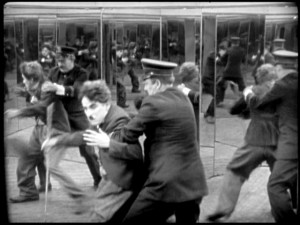 The rise to celebrity of The Tramp is the first note of relevance in The Circus. Much like Chaplin became an overnight sensation in a medium he thought fame possible, The Tramp becomes a celebrity to the festival crowd much to his unknowing. “He’s a sensation but he doesn’t even know it!” the exploitative circus owner boasts as he counts his mountains of cash. Not only does this draw attention to the fact that Chaplin himself had unknowingly become a star to thousands of filmgoers the world over, but it also draws on the exploitive nature of the business. Before they created unions and demanded respect, stars like Pickford and Florence were being exploited by their financers, forced to take other jobs on the set just to make ends meat. They were the stars, but they never knew it. The Tramp is hired on as a stage hand at the titular venue, and like Pickford, Florence and Chaplin himself, this is how he primarily made a living. He’s never made aware that he is the major audience draw until much later in the film, proving how even though an actor may be a celebrity, they can still be exploited and undervalued in the performance industry.
The rise to celebrity of The Tramp is the first note of relevance in The Circus. Much like Chaplin became an overnight sensation in a medium he thought fame possible, The Tramp becomes a celebrity to the festival crowd much to his unknowing. “He’s a sensation but he doesn’t even know it!” the exploitative circus owner boasts as he counts his mountains of cash. Not only does this draw attention to the fact that Chaplin himself had unknowingly become a star to thousands of filmgoers the world over, but it also draws on the exploitive nature of the business. Before they created unions and demanded respect, stars like Pickford and Florence were being exploited by their financers, forced to take other jobs on the set just to make ends meat. They were the stars, but they never knew it. The Tramp is hired on as a stage hand at the titular venue, and like Pickford, Florence and Chaplin himself, this is how he primarily made a living. He’s never made aware that he is the major audience draw until much later in the film, proving how even though an actor may be a celebrity, they can still be exploited and undervalued in the performance industry.
Another important topic Chaplin reflexively addresses in The Circus is the relationship between actor and audience. Chaplin was always part of an industry that relied almost single-handedly on the charisma of the performer. A drama can sweep people away in narrative, a western in sets, a horror in shadows, but a comedy is one where the actor must personally engage the audience for its effect. Imagine standup horrordy, or a morose Saturday Night Live, and you get the picture on how comedy is appended with the performer. With that in mind, Chaplin points out the unstable relationship between himself and his audience, and how one must tread a fine line in entertaining without boring the spectator.
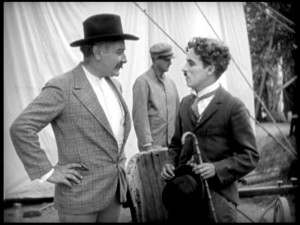 One minute The Tramp is a sensation, but the next the audience want nothing of him. He’s funny when he doesn’t know he is being funny, but once he understands his celebrity he tries to be funny and the effect is lost. In a way he is condemning the audience and their lack of but in a way he is condemning his own talents, in pointing out how hard it is to try and be funny rather than just simply be funny. The final tight rope balancing act takes on added significance as a metaphor for Chaplin’s relationship with his audience. He may be a star now, but all it takes is one misstep (ask J.Lo) and that could spell the end of his career.
One minute The Tramp is a sensation, but the next the audience want nothing of him. He’s funny when he doesn’t know he is being funny, but once he understands his celebrity he tries to be funny and the effect is lost. In a way he is condemning the audience and their lack of but in a way he is condemning his own talents, in pointing out how hard it is to try and be funny rather than just simply be funny. The final tight rope balancing act takes on added significance as a metaphor for Chaplin’s relationship with his audience. He may be a star now, but all it takes is one misstep (ask J.Lo) and that could spell the end of his career.
Chaplin also uses The Circus spectators in his film to point out the random and unpredictable nature of humor. Humor is as different between cultures as it is between individual people. Try explaining why you find a fart joke funny to your grandmother and you’ll see just how people’s conceptions of funny can be. Comedy is something from the gut, something often inexplicable, and as such it is tough to classify. Considering Charlie Chaplin was a performer who relied on laughter for his success, the fact that humor is so tough to characterize must have made his profession a challenge. Throughout The Circus he has some audience members guffaw while others sit in dead stare. Moments later a reversal occurs, and the people who were laughing are silent, while the silent bring down the house in cheer. As a comedic performer, Chaplin had to always recognize the odd nature of his business, and how humor would always register differently to different people, and with The Circus he tackles the subject head on.
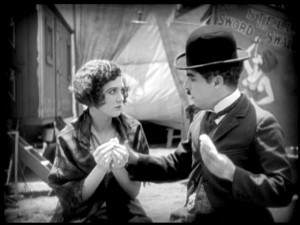 The Circus, with all its reflexivity, is more than just an entertaining Chaplin vehicle. It is a revealing one, and one that places his celebrity right out there in the open. It may have been too revealing however, as Chaplin largely shunned the film long after it was released, allowing it status as the only film not in his biography. It was a film that was made while his marriage was falling apart, among other things, and in that light the conclusion is particularly enlightening. The Tramp, after having won the heart of his female performance counterpart, decides to marry her off to someone else, exiting the film alone and by himself. For a film of such light and breezy subject matter, such a conclusion comes as quite the shock. But like he used the film to examine his celebrity and his relationship with his audience, he used the film as a cathartic tool to get himself through his marital grief.
The Circus, with all its reflexivity, is more than just an entertaining Chaplin vehicle. It is a revealing one, and one that places his celebrity right out there in the open. It may have been too revealing however, as Chaplin largely shunned the film long after it was released, allowing it status as the only film not in his biography. It was a film that was made while his marriage was falling apart, among other things, and in that light the conclusion is particularly enlightening. The Tramp, after having won the heart of his female performance counterpart, decides to marry her off to someone else, exiting the film alone and by himself. For a film of such light and breezy subject matter, such a conclusion comes as quite the shock. But like he used the film to examine his celebrity and his relationship with his audience, he used the film as a cathartic tool to get himself through his marital grief.
Martin Scorsese uses film as a place to lay out his catholic guilt, Woody Allen uses it for personal catharsis on all his Jewish and sexual quirks, and Stanley Kubrick used it to release his frustrations as an outsider in an increasingly sterile universe. The idea of film as a means of cathartic release has been a prominent notion for cinema’s auteurs for the last forty years. But before Scorsese, Allen or Kubrick, there was Chaplin, leading the way in his own reflexive self-deconstruction. Decades before such self-referentiality was ever a filmic conception, Chaplin was laying it all out with The Circus. A fine film as a comedy, and an even finer film as an autobiography, The Circus remains the great film in Chaplin’s canon that nobody seems to know about.
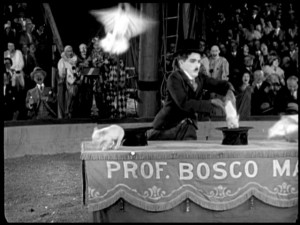 Analysis by an American: Shawn McLoughlin
Analysis by an American: Shawn McLoughlin
Charlie Chaplin was one of the masters of silent comedy. This is an undisputed fact. While film nerds like us, talk up Fatty Arbuckle and Harold Lloyd and can make arguments that Buster Keaton’s films aged better (and they have, for the most part) those discussions don’t break icons. Like Mickey Mouse, everyone recognizes The Tramp, even without having ever seen any of his films.
I don’t have any personal problem with Chaplin having that lasting power, because I enjoy his films quite a bit. But Chaplin earned respect for making films that were extremely satirical, funny, and made reflections on society. Modern Times dealt with the mechanization and industrialization of the world and is still relevant today. The Great Dictator found humor where there really wasn’t any and became one of the most biting films of all time. These films are brilliant, but it is important to realize that no director or actor burns brightly for all eternity. For every great film, there are duds – or, at very least, lesser films. The Circus is one of those lesser films.
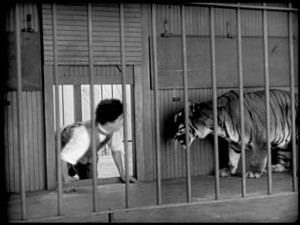 This isn’t to say that it is bad, or unmemorable. It just isn’t important or as relevant as other films in the Tramp series. But it is quite funny. There are several scenes that, while slapsticky, gave me genuine heartfelt laughs. The scene where Chaplin pretends to be a moving dummy to evade police was hilarious, and the part where he “climbed” up the tightrope was a well executed visual joke, and the entire sequence of the Tramp in the lion cage was golden. The set-up itself could have easily been an inspiration for The Three Stooges antics with much pie-in-the-face material and bits taken right out of vaudeville. But the dramatic arc of the Tramp’s relationship with Merna never develops any further than his other unlucky-in-love adventures. This renders that whole sub-plot into mundane melodrama. Making it worse, the only reason we would sympathize for Merna is that she is starved and beaten, which is essentially the extent her character is developed. What a waste.
This isn’t to say that it is bad, or unmemorable. It just isn’t important or as relevant as other films in the Tramp series. But it is quite funny. There are several scenes that, while slapsticky, gave me genuine heartfelt laughs. The scene where Chaplin pretends to be a moving dummy to evade police was hilarious, and the part where he “climbed” up the tightrope was a well executed visual joke, and the entire sequence of the Tramp in the lion cage was golden. The set-up itself could have easily been an inspiration for The Three Stooges antics with much pie-in-the-face material and bits taken right out of vaudeville. But the dramatic arc of the Tramp’s relationship with Merna never develops any further than his other unlucky-in-love adventures. This renders that whole sub-plot into mundane melodrama. Making it worse, the only reason we would sympathize for Merna is that she is starved and beaten, which is essentially the extent her character is developed. What a waste.
Essentially the only message that can be derived from the film is that circuses are for the most part unfunny. They are also uninteresting, a spectacle for spectacle sake, and have little more glamour than a traveling petting zoo. The audience (including the target audience of children) at a circus reacts more amused if they see an elephant relieve himself than when a man flies out of a barrel. Clowns and their staged antics are the worst. They are boring, and are expected to be laughed at instead of doing anything to make you laugh. This is shown particularly well with the audience reactions; they are seemingly uninterested in anything the show has to offer because there is nothing fresh or unexpected. Only after Chaplin unknowingly provides them more than their moneys worth in entertainment do they laugh. When the Tramp tries to be funny on command, he fails. This is what all of life’s good jokes are made of – things not going as planned. If the film wasn’t completely caught up in its own shenanigans, this might have been a more obvious message.
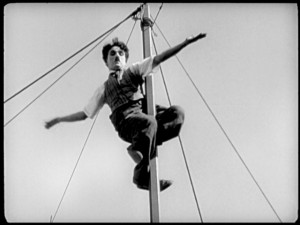 Sometimes it is difficult to realize that silent films were not just a short fad. Film was around in one format or another for thirty years before The Circus. Placing it in today’s context, it is the same time between Taxi Driver and Sisterhood of the Traveling Pants. There was a lot of cinematic ground that covered during that time. Chaplin made the medium entertaining and provided a fantastic character that was relevant to his time, and that the working (and not-so-working) class could relate to. While The Circus was one of those fluffier moments, I don’t think it aimed that high. If Chaplin’s goal here was to open the audiences’ hearts with laughter but not open their eyes to any larger issue then he succeeded.
Sometimes it is difficult to realize that silent films were not just a short fad. Film was around in one format or another for thirty years before The Circus. Placing it in today’s context, it is the same time between Taxi Driver and Sisterhood of the Traveling Pants. There was a lot of cinematic ground that covered during that time. Chaplin made the medium entertaining and provided a fantastic character that was relevant to his time, and that the working (and not-so-working) class could relate to. While The Circus was one of those fluffier moments, I don’t think it aimed that high. If Chaplin’s goal here was to open the audiences’ hearts with laughter but not open their eyes to any larger issue then he succeeded.
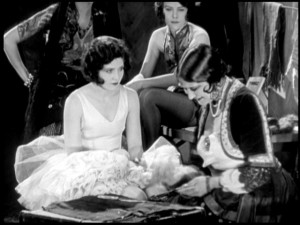 Analysis by a lawyer: Richard Stracke
Analysis by a lawyer: Richard Stracke
The Circus was a great choice for an in depth discussion because it contains just about everything that you could want from a Chaplin film. It was essentially a solo production- made during extremely trying times. It demonstrates his grace and his ability to create emotion within a throwaway plot. Along with these strengths come the flaws of most Chaplin films; the minor scenes that date poorly and are simply no longer funny. Fortunately, he was such an entertainer that the highpoints of the film are so memorable, so charming, and so fantastic that the flaws can be forgiven. With The Circus, this is even easier than normal because the great scenes haven’t been as overplayed as those of Gold Rush, Modern Times and The Great Dictator.
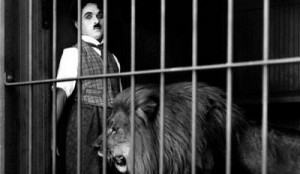 City Lights is my favorite of the Chaplin oeuvre for two simple reasons- the sense of melancholy and the endearing characters. Sure, seeing Charlie flopping around like a rag doll or pulling off near impossible stunts without so much as breaking a sweat are impressive, but I frequently remember his gestures and facial expressions long after the awe of the chase. Although not as successful overall, The Circus has a lot in common with “Lights”. The long suffering female leads for one thing. The opening scene really stands out. You have a girl who looks like she could have hopped right out of a Degas painting crumpled on the floor. Subjected to cruelty by her very own father. Yes, this is manipulative and he’s more caricature than red blooded character, but it works. I felt sorry for her. I wanted the tramp to come along and save her. Scratch that. Too melodramatic. I wanted him to provide a few moments of genuine happiness. That he does. The scene where she ends up getting his breakfast and the subsequent scenes where their friendship shine through are just what I wanted from the film. Two characters, unable to speak, but still evoking emotion. For me, this is the root of Chaplin’s genius. If you’ve read my parts of any of these other features, you’ll know that it takes a lot for me to really care about the characters. Chaplin smashes my defenses- often in the first scene. That’s simply priceless.
City Lights is my favorite of the Chaplin oeuvre for two simple reasons- the sense of melancholy and the endearing characters. Sure, seeing Charlie flopping around like a rag doll or pulling off near impossible stunts without so much as breaking a sweat are impressive, but I frequently remember his gestures and facial expressions long after the awe of the chase. Although not as successful overall, The Circus has a lot in common with “Lights”. The long suffering female leads for one thing. The opening scene really stands out. You have a girl who looks like she could have hopped right out of a Degas painting crumpled on the floor. Subjected to cruelty by her very own father. Yes, this is manipulative and he’s more caricature than red blooded character, but it works. I felt sorry for her. I wanted the tramp to come along and save her. Scratch that. Too melodramatic. I wanted him to provide a few moments of genuine happiness. That he does. The scene where she ends up getting his breakfast and the subsequent scenes where their friendship shine through are just what I wanted from the film. Two characters, unable to speak, but still evoking emotion. For me, this is the root of Chaplin’s genius. If you’ve read my parts of any of these other features, you’ll know that it takes a lot for me to really care about the characters. Chaplin smashes my defenses- often in the first scene. That’s simply priceless.
So, I had my moments of emotional fulfillment, but what about the rest of the film? For the most part I enjoy it. I’m not so fond of the recurring mule joke, but that’s largely because I’m never a fan of the Keystone Cops-esque silent film characters racing about at super high speeds. If they run, I groan. The exception is the hall of mirrors. That’s exquisite, but unfortunately they get out and run around again. The same goes for the scenes when the crew tries to train Chaplin. I’m sure there’s a lot to be said about how Chaplin was demonstrating how his comedy transcends such mediocre routines, but I didn’t enjoy them, so I’ll leave it at that.
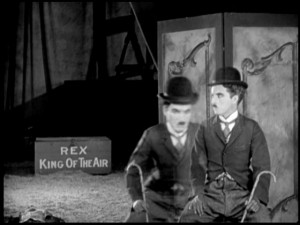 I also quite enjoy the lion cage and tightrope scenes, but those are so famous and the latter almost always cited as one of Chaplin’s best scenes, that it seems pointless to praise them. What is more important is ending. I was originally planning to write an elaborate piece on how it demonstrates the self-defeating aspects of being poor and why society shouldn’t help those who won’t help themselves, but I think that would miss the point. The film would lose its magic if it were so strictly scrutinized. It doesn’t matter what the ending signifies. It’s bittersweet and ultimately the longest lingering scene of the film. Chaplin takes us from the potential heart break of losing the girl to the realization that the Tramp may have finally found friendship to desolation in a matter of moments. Ultimately, given the horrid circumstances surrounding the film- a nasty divorce, on set disasters and financial concerns- I don’t see how it could have ended any other way. Just like his alter ego, Chaplin delights nearly all who see him, but there’s a sadness to his work. The Circus approaches this tantalizing paradox as frankly as any of Chaplin’s films. That alone makes it worth seeing.
I also quite enjoy the lion cage and tightrope scenes, but those are so famous and the latter almost always cited as one of Chaplin’s best scenes, that it seems pointless to praise them. What is more important is ending. I was originally planning to write an elaborate piece on how it demonstrates the self-defeating aspects of being poor and why society shouldn’t help those who won’t help themselves, but I think that would miss the point. The film would lose its magic if it were so strictly scrutinized. It doesn’t matter what the ending signifies. It’s bittersweet and ultimately the longest lingering scene of the film. Chaplin takes us from the potential heart break of losing the girl to the realization that the Tramp may have finally found friendship to desolation in a matter of moments. Ultimately, given the horrid circumstances surrounding the film- a nasty divorce, on set disasters and financial concerns- I don’t see how it could have ended any other way. Just like his alter ego, Chaplin delights nearly all who see him, but there’s a sadness to his work. The Circus approaches this tantalizing paradox as frankly as any of Chaplin’s films. That alone makes it worth seeing.
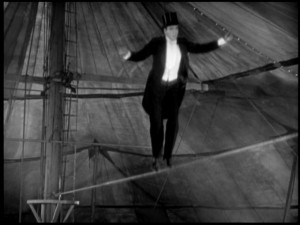 Analysis by an elitist: Adam Lippe
Analysis by an elitist: Adam Lippe
Inserted into the film more than 40 years after its premiere, the opening song in The Circus, sung by Chaplin, who was by this point an old man, is an inspired touch. It’s a sneaky way of sharing his own feelings about the movie before we’ve even had a chance to experience it. The lyrics (“Swing high…Don’t ever look down… You’ll never find rainbows if you’re looking down…Life may be dreary, but never the same, someday it’s sunshine, someday it’s rain”) seem to refer to the feelings he had making it, two years spent struggling through various disasters, his studio burning down, lost footage, his wife divorcing him, amongst other things, but also his look back on his career, long after being ostracized in the US because of financial difficulties and political affiliations. There is even a hint, seeing as the first images are of his female lead, that he is detailing the plight of women in the 20’s, not allowed any identity. Merna Kennedy’s character is just sold from one man to another, being beaten mercilessly by her father is accepted until she is now owned by her husband, and the father relinquishes rights to Rex, the tight rope walker. But it is the overwhelming discussion of capitalism versus communism that is at the real heart of The Circus.
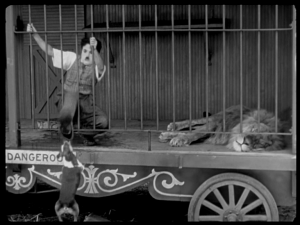 It is the political subtext that is the saving grace of The Circus, since the surface material is very standard for Chaplin. Many of Charlie Chaplin’s films are comprised of frantic slapstick mixed with maudlin and melodramatic scenes showing his character, The Tramp, as surprisingly giving and sweet, despite our initial impression showing him as reckless and selfish, always causing trouble. In this case, there is the early pickpocket chase, exhaustively displayed, its only real ingenuity is the mirror scene, parroted in The Lady From Shanghai and Enter The Dragon (and of course The Kentucky Fried Movie), which gets us in a rather contrived fashion to the circus. The preliminary establishing of the villain as a brute is out of the way, as the ring master smacks his daughter for no discernible reason. This is no accident, as he is to represent capitalistic values throughout, cold, calculating, unemotional, seeing people as property, and only interested in financial gain. His most important line of dialogue is one that isn’t even required in the scene, it’s simply a reaction to being told that Chaplin will be risking his life by replacing Rex on the tightrope. “That’s ok, I’ve got him insured.” It also outlines the sloppiness with Chaplin’s plotting, risking suspension of disbelief for the sake of his point. If his main attraction is killed, and Rex has shown himself to be unreliable by not showing up, how is he to make money? Though really, it’s never really explained what exactly Chaplin does to entertain the crowd at all, if he can only make them laugh by accident, anything planned would fail miserably. After we see that he’s aware of his own supposed talents, it seems strange that the circus would make money on his back at all.
It is the political subtext that is the saving grace of The Circus, since the surface material is very standard for Chaplin. Many of Charlie Chaplin’s films are comprised of frantic slapstick mixed with maudlin and melodramatic scenes showing his character, The Tramp, as surprisingly giving and sweet, despite our initial impression showing him as reckless and selfish, always causing trouble. In this case, there is the early pickpocket chase, exhaustively displayed, its only real ingenuity is the mirror scene, parroted in The Lady From Shanghai and Enter The Dragon (and of course The Kentucky Fried Movie), which gets us in a rather contrived fashion to the circus. The preliminary establishing of the villain as a brute is out of the way, as the ring master smacks his daughter for no discernible reason. This is no accident, as he is to represent capitalistic values throughout, cold, calculating, unemotional, seeing people as property, and only interested in financial gain. His most important line of dialogue is one that isn’t even required in the scene, it’s simply a reaction to being told that Chaplin will be risking his life by replacing Rex on the tightrope. “That’s ok, I’ve got him insured.” It also outlines the sloppiness with Chaplin’s plotting, risking suspension of disbelief for the sake of his point. If his main attraction is killed, and Rex has shown himself to be unreliable by not showing up, how is he to make money? Though really, it’s never really explained what exactly Chaplin does to entertain the crowd at all, if he can only make them laugh by accident, anything planned would fail miserably. After we see that he’s aware of his own supposed talents, it seems strange that the circus would make money on his back at all.
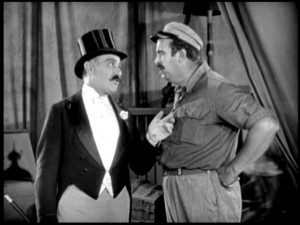 Of course, to get into the details of Chaplin’s act would miss the issues he was trying to put forth. His character’s kindness is most evident when he is trying to share, not when he becomes egotistical about his skills and financial standing. When he sees that Merna is hungry, he makes sure to split his bread evenly, just like a Communist state would. Though he falls in love with her, he doesn’t want to be selfish, and helps her leave with Rex, as it would be the best move for all of them. In a capitalist film, the individual would be most important. In The Circus, the hero, in the final image, crumples up the star, the one he earned as a capitalist entertainment centerpiece, for the betterment of everyone else.
Of course, to get into the details of Chaplin’s act would miss the issues he was trying to put forth. His character’s kindness is most evident when he is trying to share, not when he becomes egotistical about his skills and financial standing. When he sees that Merna is hungry, he makes sure to split his bread evenly, just like a Communist state would. Though he falls in love with her, he doesn’t want to be selfish, and helps her leave with Rex, as it would be the best move for all of them. In a capitalist film, the individual would be most important. In The Circus, the hero, in the final image, crumples up the star, the one he earned as a capitalist entertainment centerpiece, for the betterment of everyone else.
Rhett I think discussion should start with a discussion of Balthazar‘s cameo. He seemed angry, as if the circus life had driven him to the ground.
Richard He clearly resented being forced to do tricks.
Shawn As did I, but I am trying to listen to it now and it just doesn’t hold the same feeling. Balthazar liked Chaplin’s baggy pants.
Adam Well there Balthazar was, in a contrived gag where he randomly chased a douchebag Jew in a Hitler mustache, how would you feel?
Rhett Balthazar, being a European import, must have sensed Chaplin’s Hitler stache and immediately tried to usurp him I was so happy to see him alive and thriving it was a great cameo in a great film.
Shawn I would feel like it is time to go out to pasture with the sheep. At least his tail wasn’t set on fire.
Adam But all that running couldn’t have been in his contract. Really, Rhett? Great? How is The Circus any different than a slew of other Chaplin films chased by cops, befriends girl, sweetness prevails?
Shawn I was hoping that Chaplin would have to balance with him on the tightrope.
Richard In response to Adam’s comment- does anyone (then or now) actually enjoy those sorts of gags- sped up racing about- with no particular goal?
Rhett Its reflexivity. Its analysis of the performer spectator relationship.
Shawn *Here we go*
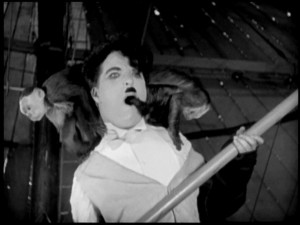 Rhett It seemed to really address Chaplin’s celebrity and the aspects of his life.
Rhett It seemed to really address Chaplin’s celebrity and the aspects of his life.
Adam That last part I will agree with, the subtext was fascinating to me while the movie itself was very banal. Its correlation to Chaplin’s own demons and the political issues especially communism vs. capitalism.
Shawn I admit to laughing quite a bit, Richard.But it wasn’t anything other than average Chaplin to me.
Rhett Artists make the best stuff when their life is in ruin, and this seemed to be a real troublesome point in Chaplin’s life, and the way he puts himself on the line here is fascinating
Adam I’d hate to think what the movie would be without the opening song which sounds treacly and pointless at first until the film settles in.
Richard That’s obviously why it was forgotten for some 30 years
Adam Why, Richard, because of the politics? I couldn’t see much else in it, there’s no internal logic in the jokes. It’s a bunch of running around and tiresome slapstick.
Richard It was actually meant to be a joke made in re: to your first comment, but I do think it fit the tone- certainly a better addition that all of those Lucas revisions.
Shawn Three Stooges material for sure.
Adam The only thing I really laughed at, other than when he replaces the apple with the banana in the William Tell bit was when he plugged his ears in the lion’s cage as if he could block out what he knew would probably happen, if he couldn’t actually hear it. That was the one moment where he was akin to the audience.
Richard I discussed the slapstick issues in my essay. Basically, in this film and most other Chaplins, I don’t care about the fast paced dare-devilry, but only the quieter, more heartfelt moments.
Adam Especially, Richard, because both Lloyd and Keaton outdid him in those fields.
Shawn The “heartfelt” moments here are overly forced. What personality does Merna have? Would you even care if she wasn’t beaten or starved? No.
Adam While the tightrope scene is fine, it goes on for a few minutes too long and then he throws monkeys in the mix which, as we all know, is exactly when a sitcom gets tired, let alone a “classic.”
Shawn Hey, Friends started out with the monkeys and ditched it in the 2nd season. Which is why that show survived IMO.
Rhett Hey, Herzog had monkeys, respect… that’s probably why he leaves her at the end like he did in real life during the film’s making.
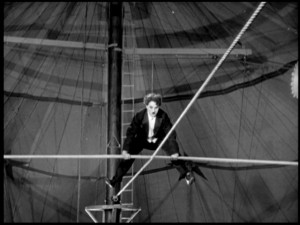 Richard I haven’t seen any Lloyd, but I agree as far as Keaton goes.
Richard I haven’t seen any Lloyd, but I agree as far as Keaton goes.
Adam Though I was honestly confused when Chaplin takes something from one of the monkeys that appears to be an apple. And then throws it into the crowd and it’s suddenly poo.
Shawn I thought it was a tomato which exploded on impact. Predating Killer Tomatoes by nearly 50 years.
Adam Something round, certainly.
Richard As far as Merna goes, Shawn is right about her lack of personality and all of that, but there’s something about the Chaplin heroine that always appeals to me. maybe it’s the sadness in their eyes or how pitiful they are, but I usually feel sorry for them.
Rhett It seemed to illustrate the hostile nature between actor and audience, and how they are laughing one moment and then the next are totally turned against you. Comedy is literally one big tight rope act.
Adam Or the fact that she is totally flat-chested. Chaplin needed a big bosomed love interest. He could have played off that.
Shawn I thought he was illustrating how circuses just aren’t funny and how the only humour is when something happens that is unplanned.
Richard I thought so too, Shawn, except that by showing scenes that weren’t funny, I wasn’t entertained.
Shawn Which is why he was a hit by running from the cops, but not when he was trying to be funny.
Rhett Yeah, he sort of illustrates the difference between being funny and trying to be funny.
Shawn None of the clowns were funny, at all.
Richard So some of his mistakes with the clowns were amusing, but not enough to make me laugh.
Shawn Because clowns aren’t funny. Honestly, go to a circus, and watch the audience.
Richard Right, but do we need that pointed out again and again?
Shawn Kids play with the lightsaber things and get excited when an elephant shits But pay no attention to the show. Because, circuses suck.
Rhett Yeah, I always went for the elephant shit.
Adam At the time though, circuses were the pinnacle of entertainment.
Shawn But they were all the same which explains the audience’s boredom.
Adam If they are still around now, they have to have entertained some kids at some point.
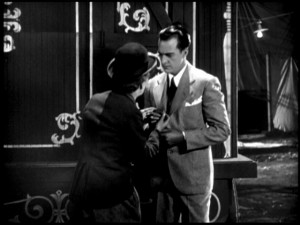 Rhett They were very much like the film industry in its early inklings though, where the performers were exploited by the financiers.
Rhett They were very much like the film industry in its early inklings though, where the performers were exploited by the financiers.
Shawn Yeah, “special” kids.
Richard Freak shows.
Rhett So it seemed fitting for Chaplin to use that as a backdrop to comment on his own life.
Adam “The same hard life.”
Richard I thought so too, Rhett. I imagine his early films were treated with less respect than what a circus performer would get- just cheap novelties
Shawn Is the 1992 Chaplin any good? You know, aside from Milla Jovovich‘s no-doubt excellent role.
Adam Shawn, it has some good acting, but like all Attenborough, it is almost too focused and has no edges to it. Attenborough was always suited to direct a mini-series about a war that people have learned about ad nauseum on The History Channel and simply want replicated not to make something about an interesting figure who is neither black nor white.
Rhett Why Attenborough never directed Gods and Generals is beyond me. From The director of Little Darlings…Gettysburg
Adam He last did* that awesomely boring and expensive direct-to-video movie starring James Bond as a Native American. The Grey Owl.
Shawn Pierce Brosnan …. Archie Grey Owl hahahhahahahaha
Rhett I didn’t have time to go through the special features, but apparently Chaplin was supposed to have a stunt double for the lion bits but did it all himself due to his depression stemming from the breakdown of his marriage it’s like a death wish documented on film.
Richard Interesting, Rhett. The rest of it was all him too, right?
Adam Yeah, you couldn’t risk the star’s life in the lion scenes since he really appeared to be in there. With the trapeze stuff, part of the gag is his being attached and safe and the other half they probably had a net. There’s never an overhead shot so we can see what is beneath him.
Rhett Did anyone listen to the 5.1 mix?
Adam I did.
Richard Me too.
Rhett Did the sub get a good workout?
Adam You couldn’t really tell the difference. It was just a glorified mono track. It’s not like the 5.1 track on The Passion of Joan of Arc.
Shawn City Lights blew out a window, fo shizzle.
Rhett You must have powerful headphones, Shawn.
Shawn I want to get the soundtrack to The Circus for my car.
Richard It would probably fit on a single cd.
Adam “Canned music for slapstick silent films: Vol. 1.”
Shawn “of 1.”
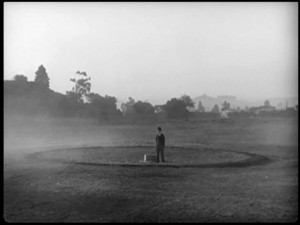 Rhett It did have the circus vibe to it. While I was watching it, my roommate came into the room without noticing I was watching a movie and asked why I was listening to circus music.
Rhett It did have the circus vibe to it. While I was watching it, my roommate came into the room without noticing I was watching a movie and asked why I was listening to circus music.
Richard Do you guys always listen to the intended score when watching silent films? I always give them a try, but lots of times I end up picking my own music.
Rhett Fiddy cent?
Richard I think I did play him during Birth of a Nation.
Rhett Fuckin’ racist.
Adam The Passion of Joan of Arc is hard to watch without the remastered opera track.
Richard I agree, Adam. It’s the only way I would ever watch it.
Adam I don’t know how a lot of these films played without music.
Richard Some of the German silents have nice scores, but I find a lot of the American ones boring. Lots of tinny piano.
Adam Have we been spoiled by the way soundtracks are done now? Layered, never silent.
Rhett I don’t think so.
Adam Or is it the theatrical staging that would make a silent boring without music?
Rhett I actually quite enjoyed the soundtrack to The Circus and I’d imagine I’d enjoy it just as much without.
Shawn I will admit it. I am of the MTV generation, and the music keeps my attention.
Richard It doesn’t exactly answer Adam’s question, but I’ve found that friends of mine struggle with certain films when there is no score or a lack of constant sound. Bunuel and Bresson are good examples.
Rhett Not having synth is a definite detriment.
Shawn I never had that problem with Bunuel. But Bunuel is visually interesting.
Richard I’ve had a few complaints that “I would’ve liked it better if there was music.”
Adam Think of something like 2004’s Birth with the amazing focus on her face for 3 minutes. Would that still work without the music?
Shawn Visually? I haven’t seen Birth yet.
Richard The scene with the Wagner? I think the music made that scene
Adam What if the music was lower? Because I thought while the music aided, I was focused on her expressions. Shawn, you should see P.S. before Birth. Similar idea, much better movie.
Richard I’d have to see it again, but having the high volume actually helped me focus on her- because I didn’t worry about any other detail noise.
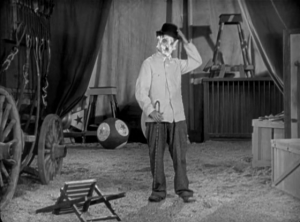 Adam In terms of The Circus, what is it that we are supposed to believe he does as part of his act that is so successful after he starts getting paid? They are doing well because of his accidental spontaneity? Which makes little sense if what made it funny was that he didn’t know what was going on.
Adam In terms of The Circus, what is it that we are supposed to believe he does as part of his act that is so successful after he starts getting paid? They are doing well because of his accidental spontaneity? Which makes little sense if what made it funny was that he didn’t know what was going on.
Richard I can’t think of much else that he could have been doing.
Shawn Balthazar vs. The Jew. Fuck, I would buy a ticket and there isn’t a damn one of you that wouldn’t either… Your silence proves I am right.
Adam Yes, a Jew being chased by an ass, that would be gold. I’d sneak in.
Shawn That doesn’t change the fact Ass vs Chaplin would be like the fuckin’ Holyfield vs. Douglas of 1929.
Adam Which movie does Chaplin box a kangaroo? It would probably be similar to that… Rhett, did you really laugh a lot at this movie?
Richard I’m thinking that’s in one of the short films, but I can’t remember.
Rhett Yes, I did actually. I found Chaplin very endearing and he seemed to milk the whole circus scenario for all it was worth.
Shawn And even at 69 minutes, that milk turned sour.
Rhett He did tightrope, the mirrors, the lion taming bit, the pie in the face, etc. Every sort of circus convention was played with.
Richard Another question about the humor; Do people really laugh when they see the pie in the face?
Adam I can’t tell whether or not this stuff has simply aged.
Richard Did they ever?
Rhett Well, we laugh at permutations of that today.
Adam Or I just don’t react well to traditional slapstick without any edge or cleverness
Rhett Like people getting shit flung at them in Not Another Teen Movie**.
Adam Actually, Rhett, that’s the worst moment in that movie.
Rhett So I imagine it would have been funny all those years ago before other such substances were thrown in faces.
Adam It’s obvious, not funny, and just kind of stale and gross.
Rhett Tell that to the packed theater that laughed their asses off at it, Adam.
Adam But is Chaplin really going for lowest common denominator? Of all the clever riffs and jokes in Not Another Teen Movie, it would be sad if that got the biggest laugh.
Rhett Pie is low brow, but shit is pubic brow low.
Adam But Teen Movie is clearly not going for highbrow.
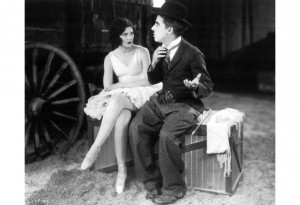 Shawn I saw Not Another theatrically Adam, and I have to say, Rhett is right. It got the biggest laugh – by far.
Shawn I saw Not Another theatrically Adam, and I have to say, Rhett is right. It got the biggest laugh – by far.
Adam I’m not arguing that they didn’t laugh hardest at it.
Richard Maybe including a few of those low brow jokes permitted him to work in the subtexts while entertaining the masses.
Adam But would Chaplin equate The Circus with NATM now?
Shawn While the AWESOME Breakfast Club parody barely got a sigh of recognition.
Adam Would he say that’s what he was going for, the actual physical substance has changed from pie to poop?
Rhett I mean, it’s like your standard Chaplin slapstick on the surface but those who look deeper into it will see a lot of subtext, be it on his own career, his divorce, capitalist exploitation, etc.
Shawn I think you have to know of Chaplin’s background to appreciate that Rhett.
Adam I get the feeling this pie fight is the reason Kubrick cut his from Dr. Strangelove.
Shawn And I would imagine his private life wasn’t quite as well-known as it is today.
Rhett Don’t really know what point you are making.
Adam I’m sure the long gestation period of the film and his divorce were probably public knowledge.
Adam My point or Shawn’s?
Rhett Shawn’s.
Shawn “Those who look deeper into it will see a lot of subtext, be it on his own career, his divorce.” That requires outward knowledge. Not everyone is knowledgeable about such things. So all the looking into the film won’t tell you anything of divorce, unless you already have that in your mind.
Adam Mine is that in order to be funny and satirical (two very different things), one need not play to the lowest common denominator.
Rhett Well, looking at On The Waterfront won’t tell you about Kazan’s situation with the communist blacklistings, but knowing that makes the weight of the film greater.
Adam Yes, but on its own, The Circus doesn’t provide very much on the surface. If we were in 1927, it would be straightforward slapstick and maudlin scenes.
Shawn On the Waterfront was released in a time where more people were looking at cinema as art though. The 20s were less kind.
Rhett The fifties were still part of the studio era. No talk of auteurism or any of that. It was still mostly entertainment.
Shawn Since when does that matter?
Rhett We are viewing the films today, and our knowledge of their background only helps to make the experience richer.
Shawn Auteurism doesn’t equal quality at all.
Rhett I am talking about the way people looked at cinema.
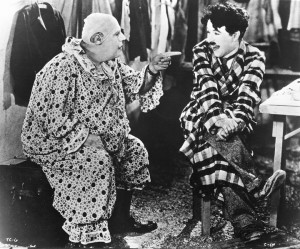 Shawn Okay, then quit “viewing the films today” and start “viewing them through a 1920s audience.”
Shawn Okay, then quit “viewing the films today” and start “viewing them through a 1920s audience.”
Rhett Before Godard and co. started considering film as art, I imagine, with the great depression looming, such negative talks towards capitalism would be embraced by audiences. How the circus boss doesn’t care whether Chaplin lives or dies because he has a life insurance policy on him.
Adam Being a Communist was illegal in the US at the time. Right after the Bolshevik Revolution people thought that the Communists would invade and take over.
Rhett Yeah, but it would be natural to express anti-capitalist sentiment.
Shawn That type of disdain for the Fat Cats was pretty standard though. But I do see that point.
Adam We’re reading into what Chaplin probably intended, though it would fly over the audience’s head at the time.
Rhett And why should that matter? The genius of most of the great films of cinema are realized long after they are released.
Adam It doesn’t matter, but it creates a different line of thinking, because it is simple entertainment.
Rhett 2001, Citizen Kane, etc., even without the divorce stuff.
Adam We’re bringing Paparazzi baggage to it. And nowhere does The Ring Master say: “I am going to destroy your life and eat your soul. And I can’t wait to do that.”
Shawn I doubt anyone was trying to prevent The Circus’ release.
Rhett It’s pretty obvious that Chaplin is examining his own fame with the film, making the tramp a performer.
Shawn Except maybe Balthazar.
Richard I agree with Rhett- I think creator’s intent is more important than the idiotic audiences, but like Adam said, it’s also valuable to try to place yourself in the mind of the audience- although that was difficult for me in this situation.
Rhett I really think it’s irrelevant to be discussing the audience in 1920.
Shawn Why?
Rhett It has no bearing on the film, and nor do we really know anything about what audiences were like in the 20’s.
Shawn Do you think it was intended for the DVD viewers of 2005? Audience has no bearing on a film? Have you not seen a Hollywood film? Audience has EVERYTHING to do with MOST films.
Rhett I view a piece of artwork with what the artist had in mind for it, not for what a member of the audience will get out of it.
Shawn That’s noble of you. But it doesn’t change the fact that movies were made to sell tickets. Especially in the 20s.
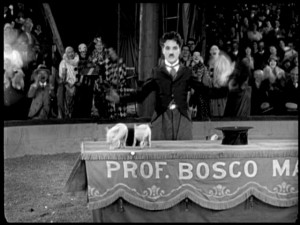 Rhett So is Napoleon Dynamite supposed to be a better film viewed in the way it affected its audience?
Rhett So is Napoleon Dynamite supposed to be a better film viewed in the way it affected its audience?
Adam Rhett, the movie is more annoying because of the audience because it was accepted so thoroughly. The spouting of quotes, etc. If it was just a piece of shit that no one saw it wouldn’t be lingering within the culture.
Richard I agree with Adam on that. Constant over exposure made me HATE it. Otherwise I’d forget it- like so many others.
Shawn That and it was still made with an intention to be hip. Thus, appealing to an audience. Tailor made to sell t-shirts.
Richard Vote Pedro. I saw one of those atrocities at the law school today and I could’ve cried.
Shawn I want a Balthazaar t-shirt.
Rhett Vote for Balthazar.
Adam I’d like a shirt like that, simply because no one would get it.
Shawn We should only make four of them. The official shirt of the Elite.
Rhett I’d wear it.
Richard Are we the only ones who appreciate Balthazar on that level? Surely some Criterion forum members obsess over his constant cameos.
Richard I’d wear it if it was small.
Rhett Tube top, Richard?
Richard Perfect.
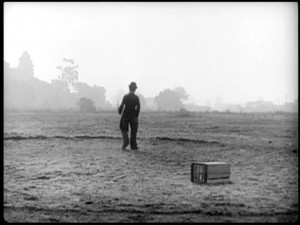 * Since this chat occurred in 2005, Attenborough directed one film, Closing the Ring, which received a contractual theatrical release, before being released on DVD two weeks later, some three years after it was shot.
* Since this chat occurred in 2005, Attenborough directed one film, Closing the Ring, which received a contractual theatrical release, before being released on DVD two weeks later, some three years after it was shot.
** Just like the silly jokes about Jew vs. Ass, the reference to Not Another Teen Movie is a dig at me since that’s a movie I particularly enjoy, and Rhett, obviously, does not.



